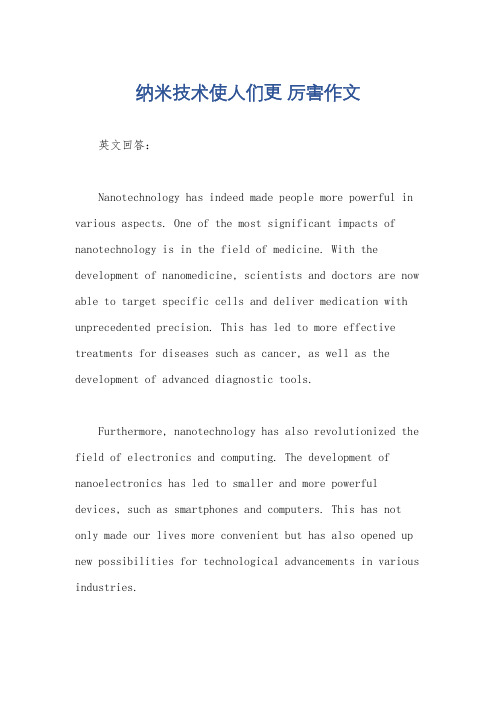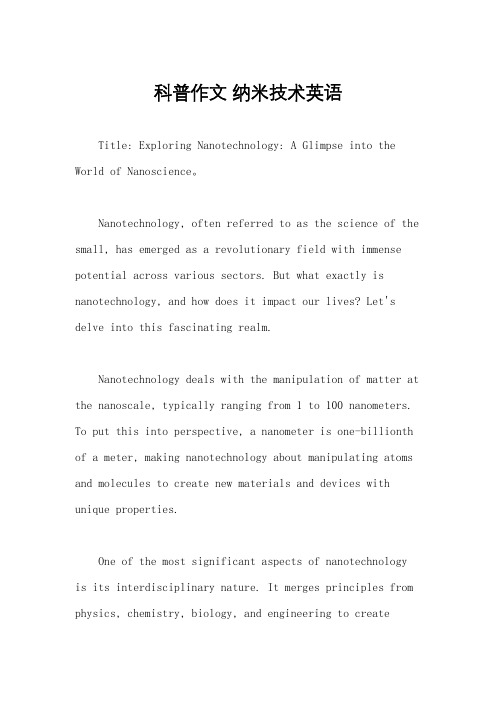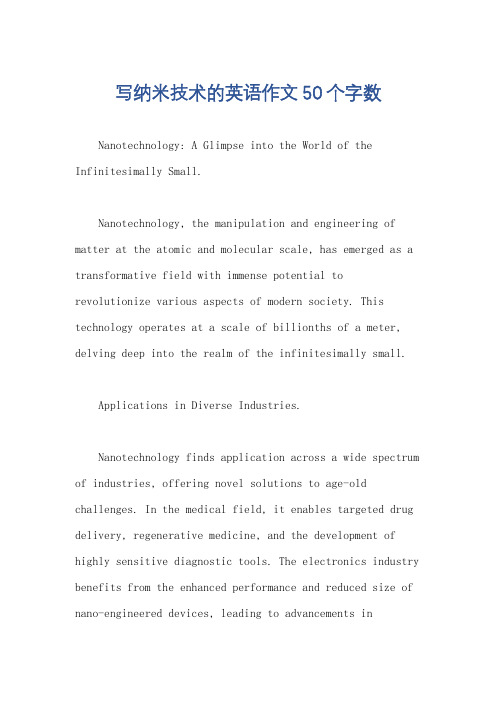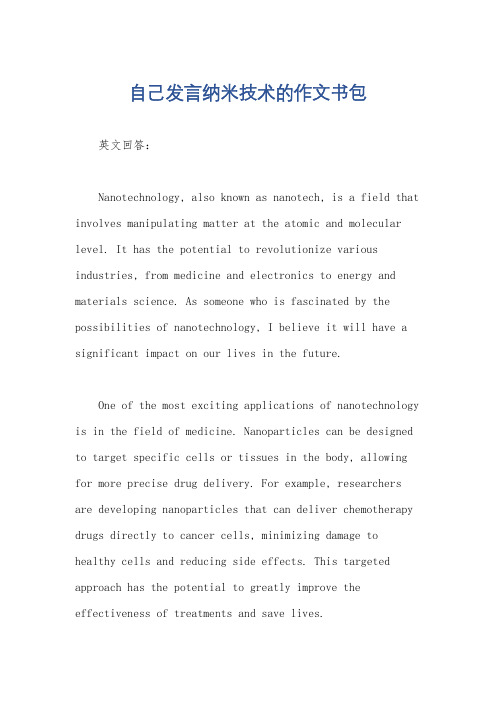纳米技术英语演讲稿aglimpseofthenanoword还有对应的word文档呢.pptx
纳米技术使人们更 厉害作文

纳米技术使人们更厉害作文英文回答:Nanotechnology has indeed made people more powerful in various aspects. One of the most significant impacts of nanotechnology is in the field of medicine. With the development of nanomedicine, scientists and doctors are now able to target specific cells and deliver medication with unprecedented precision. This has led to more effective treatments for diseases such as cancer, as well as the development of advanced diagnostic tools.Furthermore, nanotechnology has also revolutionized the field of electronics and computing. The development of nanoelectronics has led to smaller and more powerful devices, such as smartphones and computers. This has not only made our lives more convenient but has also opened up new possibilities for technological advancements in various industries.In addition, nanotechnology has also improved the efficiency of energy production and storage. Nanomaterials are being used to develop more efficient solar panels and batteries, which is crucial in the efforts to combat climate change and move towards sustainable energy sources.Overall, nanotechnology has undoubtedly made people more powerful in terms of medical treatments, technological advancements, and sustainable energy solutions.中文回答:纳米技术的确使人们在各个方面更加强大。
如何写关于纳米技术的英语作文

如何写关于纳米技术的英语作文Nanotechnology: The Science of the Small.Nanotechnology is the science of manipulating matter on a nanometer scale (one billionth of a meter). This fieldhas the potential to revolutionize many industries,including medicine, manufacturing, and energy.Applications in Medicine.Nanotechnology offers numerous applications in the medical field. Nanoparticles can be used to deliver drugs and other treatments directly to affected areas of the body, reducing side effects and improving efficacy. Nanosensors can detect diseases at an early stage, allowing for prompt intervention and improved patient outcomes. Regenerative medicine applications include nanoengineered scaffolds that guide tissue growth and repair.Manufacturing Innovations.Nanotechnology is also transforming manufacturing processes. Nanomaterials can be used to create stronger and lighter materials for industries such as aerospace and automotive. Nanocoatings can enhance the durability and performance of surfaces, extending the lifespan of products. Additive manufacturing techniques, such as 3D printing, are enhanced by nanomaterials that enable the creation of complex and precise structures.Energy Solutions.Nanotechnology is playing a significant role in developing new energy technologies. Nanoscale devices can efficiently capture and store solar energy. Nanostructured materials improve the performance of fuel cells and batteries. Additionally, nanotechnology contributes to energy conservation by enabling the development of more efficient lighting and insulation systems.Environmental Applications.Nanotechnology holds promise for addressing environmental challenges. Nanoparticles can be used to remove pollutants from water and air. Nanomaterials can enhance the efficiency of solar panels and wind turbines, reducing our reliance on fossil fuels. Moreover, nanotechnologies can contribute to bioremediation efforts by facilitating the degradation of harmful substances.Ethical Considerations.While nanotechnology offers immense potential, it also raises ethical concerns. The small size of nanoparticles makes them difficult to track and control, raising questions about their long-term environmental and health impacts. Ethical guidelines are necessary to ensure the responsible development and use of nanotechnology.Future Prospects.Nanotechnology is a rapidly evolving field with the potential to reshape our world. From advancements in medicine to innovations in manufacturing and sustainableenergy solutions, nanotechnology promises to bring about transformative changes in the years to come. Continuous advancements in research and development are expected to unlock even more applications and push the boundaries of this revolutionary technology.Conclusion.Nanotechnology is a multidisciplinary field that bridges the gap between science and engineering. Its applications span various sectors, offering the potential to address global challenges, advance human health, and shape the future of industries. With ongoing research and responsible development, nanotechnology holds the key to unlocking new frontiers and improving the quality of life for generations to come.。
科普作文 纳米技术英语

科普作文纳米技术英语Title: Exploring Nanotechnology: A Glimpse into the World of Nanoscience。
Nanotechnology, often referred to as the science of the small, has emerged as a revolutionary field with immense potential across various sectors. But what exactly is nanotechnology, and how does it impact our lives? Let's delve into this fascinating realm.Nanotechnology deals with the manipulation of matter at the nanoscale, typically ranging from 1 to 100 nanometers. To put this into perspective, a nanometer is one-billionth of a meter, making nanotechnology about manipulating atoms and molecules to create new materials and devices with unique properties.One of the most significant aspects of nanotechnology is its interdisciplinary nature. It merges principles from physics, chemistry, biology, and engineering to createinnovative solutions to complex problems. For instance, in medicine, nanotechnology enables targeted drug delivery, where medications are precisely delivered to diseased cells, minimizing side effects and improving efficacy.Furthermore, nanotechnology has revolutionized thefield of electronics. The continual miniaturization of electronic components has led to the development of smaller, faster, and more efficient devices such as smartphones, computers, and sensors. Nanomaterials like graphene and carbon nanotubes exhibit remarkable electrical properties, paving the way for advancements in electronics and computing.In the realm of energy, nanotechnology offers promising solutions for renewable energy sources and energy storage. Nanomaterials are being explored for more efficient solar cells, lightweight and durable batteries, and improved catalysts for fuel cells. These advancements are crucialfor addressing energy challenges and transitioning towardsa sustainable future.Moreover, nanotechnology has profound implications for environmental remediation and monitoring. Nanomaterials can be engineered to remove pollutants from water and air more effectively. Additionally, nanosensors enable real-time monitoring of environmental parameters, aiding in pollution control and resource management.Despite its numerous potential applications, nanotechnology also raises concerns regarding safety and ethical implications. The unique properties of nanomaterials may pose unknown risks to human health and the environment. Therefore, it is essential to conduct thorough research on the safety of nanoproducts and establish regulations to ensure responsible development and usage.In conclusion, nanotechnology holds immense promise in revolutionizing various aspects of our lives, from healthcare and electronics to energy and the environment. By harnessing the power of the nanoscale, we can address pressing challenges and pave the way for a brighter and more sustainable future.。
写纳米技术的英语作文50个字数

写纳米技术的英语作文50个字数Nanotechnology: A Glimpse into the World of the Infinitesimally Small.Nanotechnology, the manipulation and engineering of matter at the atomic and molecular scale, has emerged as a transformative field with immense potential torevolutionize various aspects of modern society. This technology operates at a scale of billionths of a meter, delving deep into the realm of the infinitesimally small.Applications in Diverse Industries.Nanotechnology finds application across a wide spectrum of industries, offering novel solutions to age-old challenges. In the medical field, it enables targeted drug delivery, regenerative medicine, and the development of highly sensitive diagnostic tools. The electronics industry benefits from the enhanced performance and reduced size of nano-engineered devices, leading to advancements incomputing, storage, and communication. The energy sector explores the use of nanomaterials in solar cells, batteries, and hydrogen storage, promoting sustainable energy solutions. Furthermore, nanotechnology has applications in materials science, manufacturing, agriculture, and environmental remediation, among others.Novel Materials and Structures.One of the key aspects of nanotechnology lies in the creation of novel materials and structures with unique properties. By manipulating matter at the nanoscale, scientists can tailor materials to exhibit specific characteristics, such as increased strength, lightweight, improved conductivity, and optical properties. These materials pave the way for advances in lightweight vehicles, energy-efficient buildings, and cutting-edge electronics.Biomedical Advances.In the biomedical realm, nanotechnology has unlocked unprecedented opportunities for the diagnosis, treatment,and prevention of diseases. Nanoparticles can be engineered to target specific cells or tissues, delivering therapeutic agents directly to the site of action. This targeted approach minimizes side effects and improves treatment efficacy. Nanomaterials also facilitate the development of biosensors that can detect biomarkers with exceptional sensitivity, enabling early disease detection and personalized medicine.Environmental Impact.Nanotechnology holds promise for addressing environmental challenges. Nano-engineered materials can enhance the efficiency of water purification systems, remove pollutants from the air and soil, and facilitate the development of renewable energy sources. Additionally, nanotechnology enables the creation of sustainable materials that reduce the environmental footprint of various industries.Ethical Considerations.As nanotechnology continues to advance, it is imperative to address the ethical considerations it raises. The potential risks associated with the release of nanoparticles into the environment and their impact on human health require careful evaluation. Open and transparent discussions among scientists, policymakers, and the public are crucial to ensure responsible and ethical development and deployment of nanotechnology.Conclusion.Nanotechnology stands as a pivotal technology with the potential to transform numerous aspects of modern society. Through the manipulation of matter at the atomic and molecular scale, it opens up new avenues for innovation, paving the way for advancements in healthcare, energy, materials science, and beyond. While ethical considerations must be carefully addressed, the potential benefits of nanotechnology are vast and hold promise for a more sustainable, healthy, and technologically advanced future.。
科普作文 纳米技术英语

科普作文纳米技术英语下载温馨提示:该文档是我店铺精心编制而成,希望大家下载以后,能够帮助大家解决实际的问题。
文档下载后可定制随意修改,请根据实际需要进行相应的调整和使用,谢谢!并且,本店铺为大家提供各种各样类型的实用资料,如教育随笔、日记赏析、句子摘抄、古诗大全、经典美文、话题作文、工作总结、词语解析、文案摘录、其他资料等等,如想了解不同资料格式和写法,敬请关注!Download tips: This document is carefully compiled by theeditor. I hope that after you download them,they can help yousolve practical problems. The document can be customized andmodified after downloading,please adjust and use it according toactual needs, thank you!In addition, our shop provides you with various types ofpractical materials,such as educational essays, diaryappreciation,sentence excerpts,ancient poems,classic articles,topic composition,work summary,word parsing,copyexcerpts,other materials and so on,want to know different data formats andwriting methods,please pay attention!Sure, here's a snippet of a conversational-style English essay on Nanotechnology, without a traditional structure or headings:1. (Randomness 1)。
自己发言纳米技术的作文书包

自己发言纳米技术的作文书包英文回答:Nanotechnology, also known as nanotech, is a field that involves manipulating matter at the atomic and molecular level. It has the potential to revolutionize various industries, from medicine and electronics to energy and materials science. As someone who is fascinated by the possibilities of nanotechnology, I believe it will have a significant impact on our lives in the future.One of the most exciting applications of nanotechnology is in the field of medicine. Nanoparticles can be designed to target specific cells or tissues in the body, allowing for more precise drug delivery. For example, researchers are developing nanoparticles that can deliver chemotherapy drugs directly to cancer cells, minimizing damage to healthy cells and reducing side effects. This targeted approach has the potential to greatly improve the effectiveness of treatments and save lives.Another area where nanotechnology holds great promiseis in electronics. As electronic devices become smaller and more powerful, nanotechnology plays a crucial role in their development. Nanoscale transistors, for instance, enable faster and more efficient computing. Additionally, nanomaterials such as graphene have unique electrical properties that could revolutionize the design of batteries and energy storage devices. This could lead to longer-lasting smartphones, electric vehicles with extended range, and more efficient renewable energy systems.Furthermore, nanotechnology has the potential to revolutionize the field of materials science. By manipulating the structure of materials at the nanoscale, scientists can create materials with enhanced properties. For example, carbon nanotubes are incredibly strong and lightweight, making them ideal for applications in aerospace and automotive industries. Nanocomposites, which are materials made by combining nanoparticles with a matrix material, have improved mechanical, thermal, and electrical properties. This opens up possibilities for stronger andlighter building materials, more efficient solar panels, and even self-healing materials.中文回答:纳米技术,也被称为纳米科技,是一门涉及在原子和分子层面上操纵物质的领域。
用纳米技术发挥想象的作文
用纳米技术发挥想象的作文英文回答:Nanotechnology is a fascinating field that has the potential to revolutionize many aspects of our lives. For example, imagine a world where we can use nanotechnology to create super-efficient solar panels that are smaller and more affordable, making it easier for people to harness the power of the sun to generate electricity for their homes. This could have a huge impact on the environment and help to reduce our dependence on fossil fuels. Another exciting possibility is the use of nanotechnology in medicine, where tiny nanoparticles could be used to deliver drugs directly to cancer cells, minimizing the side effects of treatment. The possibilities are endless when it comes to nanotechnology, and I can't wait to see how it will continue to shape our world in the future.中文回答:纳米技术是一个令人着迷的领域,它有潜力彻底改变我们生活的许多方面。
我发明的纳米新技术作文
我发明的纳米新技术作文英文回答:Nano New Technology: Revolutionizing the Future.In recent years, I have been working tirelessly to develop a groundbreaking technology that has the potential to revolutionize various industries. This technology, known as Nano New Technology, harnesses the power of nanotechnology to create innovative solutions to complex problems. Its applications are vast and have the potential to transform sectors such as healthcare, electronics, energy, and environmental sustainability.One of the most exciting applications of Nano New Technology is in the field of medicine. With the ability to manipulate matter at the nanoscale, this technology can be used to develop targeted drug delivery systems. By encapsulating drugs in nanoparticles, we can ensure that they reach their intended targets in the body, increasingtheir efficacy and reducing side effects. For example, imagine a cancer patient receiving chemotherapy that specifically targets cancer cells, leaving healthy cells unharmed. This would revolutionize cancer treatment and greatly improve patient outcomes.Another area where Nano New Technology can make a significant impact is in the field of electronics. By utilizing nanoscale materials, we can create smaller, faster, and more efficient electronic devices. For instance, imagine a smartphone that is not only thinner and lighter but also has a longer battery life and faster processing speed. This would greatly enhance the user experience and open up new possibilities for technological advancements.Furthermore, Nano New Technology has the potential to revolutionize the energy sector. By harnessing the unique properties of nanomaterials, we can develop more efficient solar panels and energy storage devices. This would enable us to generate clean and renewable energy on a larger scale, reducing our dependence on fossil fuels and mitigating the effects of climate change. Imagine a world where everyhousehold has access to affordable and sustainable energy, leading to a greener and more sustainable future.In addition to healthcare, electronics, and energy, Nano New Technology can also play a crucial role in environmental sustainability. For example, nanomaterials can be used to purify water, removing contaminants and pollutants. This could provide clean drinking water to communities that currently lack access to it, improving their quality of life and reducing the spread of waterborne diseases. Moreover, nanotechnology can be used to develop more efficient and environmentally friendly manufacturing processes, reducing waste and minimizing the environmental impact of various industries.中文回答:纳米新技术,改变未来的革命。
畅想纳米技术英语作文
畅想纳米技术英语作文Title: Envisioning the Future: A Dive into the Captivating World of NanotechnologyAs we stand on the brink of scientific breakthroughs, peering into the vast expanse of the unknown,纳米技术looms on the horizon, a beacon of unparalleled transformation. But what truly lies beyond this shimmering horizon? Let us embark on a journey, propelled by the wings of imagination, to explore the mesmerizing possibilities that nanotechnology has in store for humanity.In this not-so-distant future, nanotechnology unfurls its ethereal wings, redefining the boundaries of medicine. Microscopic robots, crafted with precision and ingenuity, navigate the intricate labyrinths of the human body, carrying precious cargos of drugs to cells in need. They wade through the rivers of our bloodstream, unseen guardians in a world too small for the naked eye, eradicating diseases before they bloom. Cancers, once dreaded adversaries, shrink under the targeted assaults of nanoparticles, their malignant reign halted by these diminutive yet mighty champions.The realms of material science are equally transformed. Fabrics whisper with newfound functionalities—clothingimbued with nanoparticles repel stains and sweat, weather becoming an afterthought to those clad in these smart weaves. Building materials gain life, adapting to their surroundings, repairing cracks upon their emergence, and ensuring structures remain pristine and enduring as the centuries roll by. Translucent displays, thinner than a feather and more versatile than a dream, replace bulky screens, heralding an age where technology seamlessly integrates with everyday life.Environmental conservation receives a boost akin to the shot of an elixir. Nanofilters bring the purifying touch of deities to water supplies, cleansing them of pollutants and rendering them crystalline. The air we breathe becomes a canvas of innovation, where nanoscale catalysts gobble up pollutants, ensuring skies remain canvases of blue and clouds, the softest of whites. Energy production ascends into a new dawn, solar cells imbued with nanomaterials capture light with unprecedented efficiency, storing it in batteries that defy the limits of yesterday's technology.But perhaps the most profound shift is the one invisible to the naked eye—the change in our perception of the world. As nanotechnology interlaces with every fiber of society, the notion of size acquires a new dimension. What once seemedmundane now sparkles with potential; the microscopic becomes the macroscopic in terms of impact. Education evolves, spurred by the wonders of atomically precise manipulation, and children learn not just to observe but to envision—for they stride in a world where dreams are woven from atoms and possibilities are infinite.Nanotechnology, therefore, is not merely an exploration of the small; it is a voyage into the boundless expanse of the hitherto unimaginable. It challenges us to broaden our minds, to embrace the inconceivable, and to redefine the limits of reality. As we continue to reach, stretch, and strive for this shimmering future, let us remember that the power of nanotechnology lies not only in its promise but in its ability to transform that promise into tangible marvels that enrich our lives. In the tapestry of tomorrow, nanotechnology is the thread that weaves together the scattered pieces of our collective aspiration, creating a vision of the future that is breathtaking in its beauty and limitless in its scope.。
关于纳米技术 这作文
关于纳米技术这作文英文回答:Nanotechnology is a field that involves manipulating matter at the atomic and molecular level. It has the potential to revolutionize various industries and bring about significant advancements in science and technology. One of the key advantages of nanotechnology is its ability to enhance the properties of materials, making them stronger, lighter, and more durable. For example, the use of nanomaterials in the construction industry can result in buildings that are resistant to corrosion and have improved thermal insulation.Another area where nanotechnology shows great promiseis in medicine. Nanomedicine involves the use of nanoparticles to deliver drugs directly to targeted cellsin the body, minimizing side effects and maximizing therapeutic efficacy. This targeted drug delivery system can be particularly beneficial in the treatment of cancer,as it allows for the destruction of cancer cells while sparing healthy ones. Additionally, nanosensors can be used to detect diseases at an early stage, enabling prompt intervention and better treatment outcomes.Furthermore, nanotechnology has the potential to revolutionize the field of electronics. By miniaturizing electronic components, nanotechnology can lead to the development of smaller, faster, and more efficient devices. For instance, nanoscale transistors can be used to create ultra-high-density memory chips, enabling the storage of vast amounts of data in a tiny space. Nanotechnology also has applications in renewable energy, such as the development of more efficient solar cells and batteries with higher energy storage capacities.中文回答:纳米技术是一种涉及到原子和分子级别的物质操控领域。
